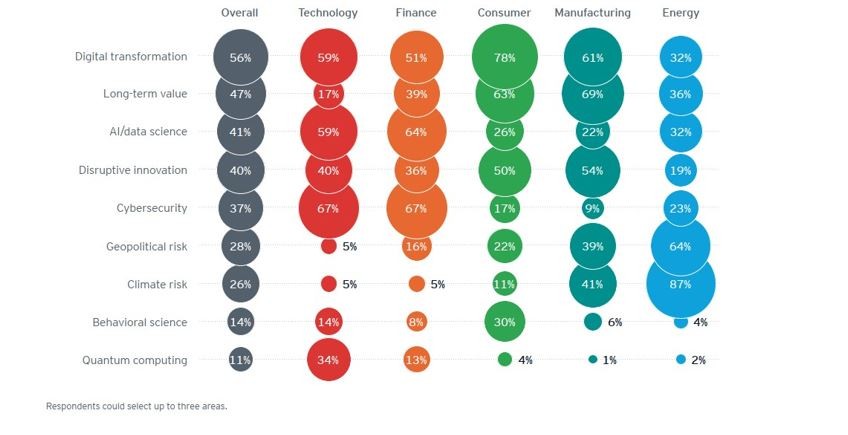The long-term value creation “say-do” gap
The research found that over the next five years, 87% of respondents believe the creation of long-term value across stakeholders will be welcomed and rewarded by the market, while 91% of respondents believe new business models will increasingly incorporate aspects of the circular economy. Alongside this, 80% agree there is likely to be a global standard for measuring and reporting long-term value creation and 80% agree that their organizations will take significant new steps to take environmental, social and corporate governance (ESG) responsibility inside their operations. However, analysis of responses against key long-term value dimensions such as societal, human, financial and customer, revealed a clear “say-do” or intention-action gap.
DNA of the future enterprise
The research found leaders face key capability and execution gaps, with actions failing to meet intentions when it comes to generating long-term value, changing organizational structures from inhibiting agility, and sluggish investment in ecosystems hampering resilience. Addressing these gaps will require a top-down strategy focused on three interconnected value drivers:
- Placing humans at the center of everything the organization does, increasing agility to react to changing market and consumer demands.
- Technology at speed, empowering organizations to deploy new solutions faster.
- Innovation at scale, collaboration among organizations across an ever-increasing ecosystem to move into new markets.
By focusing on these value drivers, CEOs can reorient their organizations around a culture built for continuous transformation and set their businesses up to outperform competitors in the short-, medium- and long-term.
Andy Baldwin adds,
“While the research highlights that CEOs are willing to transform, EY data found a clear gap between intention and execution particularly when it comes to long-term value and ESG. Given the sense of urgency around these issues is only increasing, CEOs will come under greater regulatory and reputational pressure to operate differently. Leaders need to follow through their public commitments with action to demonstrate they are taking the bold steps needed to drive long-term value and change.”
-ends-
Notes to Editors
About EY
EY exists to build a better working world, helping to create long-term value for clients, people and society and build trust in the capital markets.
Enabled by data and technology, diverse EY teams in over 150 countries provide trust through assurance and help clients grow, transform and operate.
Working across assurance, consulting, law, strategy, tax and transactions, EY teams ask better questions to find new answers for the complex issues facing our world today.
EY refers to the global organization, and may refer to one or more, of the member firms of Ernst & Young Global Limited, each of which is a separate legal entity. Ernst & Young Global Limited, a UK company limited by guarantee, does not provide services to clients. Information about how EY collects and uses personal data and a description of the rights individuals have under data protection legislation are available via ey.com/privacy. EY member firms do not practice law where prohibited by local laws. For more information about our organization, please visit ey.com.
This news release has been issued by EYGM Limited, a member of the global EY organization that also does not provide any services to clients.
About the survey
The global EY CEO Imperative Study 2021 was designed and developed by EYQ, an EY global think tank. EYQ generates new insights by bringing together business, the public sector and academia to challenge entrenched thinking, shift perceptions and help catalyze change.
The study findings are based on survey interviews with 305 global CEOs among the Forbes Global 2000. Forbes Insight conducted the fieldwork between October and December 2020.
This publication is part of the EY CEO Imperative Series, which provides critical answers and actions to help CEOs to reframe their organization’s future. For more insights in this series, visit www.ey.com/ceo.


